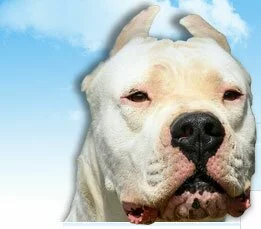 |
 |
||||
|
During the last few years, the Dogo Argentino Club of Bulgaria (est. 1995) has made significant progress in regards to its activities which resulted in increased Dogo popularity and interest of many Dogo owners and breeders at the international level. Also to mention, Zlatan, together with Philip Dimitrov, was actively involved in excellent organization of the Club's specialty shows and introduced new Dogos of very strong genotype to this part of Europe. I would like to thank Radostina and Zlatan for their time and the in-depth interview. We recommend to visit the web site: http://www.dogobg.com/
JT: This year, The Dogo Argentino Club of Bulgaria (established in 1995) concluded its third champion show and the annual wild boar hunting test. Can you please explain the increased popularity of Dogo Argentino in Bulgaria and circumstances that resulted to establish the breed club? What is the club objective and mission? And, what are the major club activities? Radostina Toneva: Formation of our club was motivated by the arrival of two Dogos from Argentina to Bulgaria in 1992. At that time, "cinology" was not so popular idea but after we gained knowledge about the temperament and history of Dogo in details we realized that all must be educated. In our country, as in many other countries, there was a risk that the dog would end up in hands of careless people who would stake its aggression to other dogs. In first years of the democracy, many breeds that arrived here were named "fighting" even the long and meticulous selection had strived to diminish this instinct. The first idea was that - this beautiful animal can't be at gage of impure motives. We worked very hard in this direction but we lost the selection. JT: What is the number of the club members as well as the number of their dogs? Zlatan Rangelov: Since the establishment date, more than 480 dogs have been registered in the club's breeding book and the number increases every day. After importing new dogs we are expecting very big interest for breeding and overall popularity of Dogo Argentino in Bulgaria. For a pity, there is a very high number of breeding that is not under the club's umbrella. It is estimated that there are 5-6 times more dogs without documents comparing to the number registered in the club's files. JT: The hunting test was very impressive. Can you please explain the rules of the test? Zlatan Rangelov: The rules for the boar test in Bulgaria are not for Dogo only and for our boar hunting dogs. They are different from the pen test. In short, in a place in wood (in pen), in the area which is about 200 - 300 sq.m., boar is let in and then Dogo. First, the dog must find the boar very fast - not longer than 2 minutes and then catch it or bark around the boar in the case when the boar is big or aggressive or the dog is too young. If the Dogo catches the boar the judges separate them. The judges point when Dogo find boar alone and how fast, if Dogo attacks boar, if Dogo catches boar, if Dogo keep away from boar attack, etc. Last time when we organized the boar test, my dog Amigo was 2nd placed - he caught the boar and didn’t let it move. I opened his jaw with cotter . JT: Antonio and Agustino Nores Martinez of Argentina, the great developers of Dogo Argentino, emphasized: Zlatan Rangelov: I think that the FCI recognition of the breed was not a fault. Really, if FCI did not recognized the breed, Dogo would be a better hunter but only in Argentina. In the world, the breed would not be known very well as our local boar hunting dogs. It might be that we wouldn’t know for the breed now and we wouldn’t love it like now. If FCI didn’t recognize Dogo, yes, it could preserve it more as a hunting breed but the condition would be going to be as for our breed Barak – that is to be known only locally. JT: Who is your favourite dogo of all times and why? Zlatan Rangelov: My knowledge about the famous Dogos is from the net. Based on what I have read and seen from internet, my favourite Dogo is Indio del Litoral. Why? Because, for me, he was completely the best. He had a perfect body - very good angulations, strong body and bones, perfect head, correct legs and more. He was a very good reproducer - he produced a lot of good and famous Dogos. And, not at the last place, he was an excellent hunter - he was proven in real hunt and many hunting competitions. Also, he had good health and lived 14 years . JT: How you see the future of the breed? Zlatan Rangelov: I don’t believe that future of the breed depends on the breeding in Bulgaria. I hope that breeders from Argentina are going to take their responsibility when breeding and selling puppies, with guarantee for absence of genetic illness. Each Dogo sold in Europe bears big importance. I know how expensive is to import dogs from there and what risk it is this but namely of these import dogs to entrust expectations and a lot of stud . In case that they have genetic problems - this problem is multiply many times. For the future of the breed in Bulgaria I personally wish conscientious and responsible breeders. Parallel with this number, one is to cross healthy dogos by doing strong relations from who have necessity really. Of course, I hope import of new blood is to be continued together withthe increased number of true fans of the breed. |
|||||
|
|
